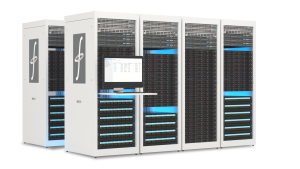 CLOUD
CLOUD
 CLOUD
CLOUD
 CLOUD
CLOUD
Well-funded data center startup Fungible Inc. today debuted an ambitious combination of hardware and software components that target a market that has been out of vogue recently: the corporate data center.
The company is leveraging capabilities in its F1 data processing unit, or DPU, to deliver a composable package of data center infrastructure that it says can deliver scale and cost efficiencies that exceed even those of hyperscale service providers. Composable infrastructure treats compute, storage and network devices as configurable resources that can be flexibly provisioned based on workloads.
Fungible’s DPU technology is designed to offload low-level tasks such as encryption and data compression from central processing units, thereby freeing up the processors to work on computational tasks. The custom chip incorporates heavily multithreaded general-purpose CPUs and task-specific accelerators designed for concurrent computation tasks. Using DPUs not only frees up central processors to do more important things but increases utilization rates on networks as much as fourfold, Chief Executive Pradeep Sindhu (pictured) recently told David Vellante in an interview on theCUBE, SiliconANGLE Media’s video studio (below).
Fungible is targeting inherent inflexibility in the way hardware has long been provisioned, said Pardha Pyla, the company’s vice president of solutions & design. “An increasingly large number of units are needed to address a variety of workloads,” he said. “Once hardware is procured it’s immutable. We cannot take an idling workload and move it. That creates marooned islands of resources and data center utilization that is as low as 20% in some cases.”
Artificial intelligence applications have further contributed to data center inefficiency by driving up the need for input/output. “The percentage of workload which is data-centric has gone from maybe 1% to 2% to 30% to 40%,” Sindhu said.
Fungible’s technology improves transistor efficiency by a factor of 30 and can drive network utilization rates of up to 95%, compared with the 25% that is common in most data centers. DPUs can also accommodate specialized processors, such as graphics processing units, that are commonly used to offload tasks from CPUs in artificial intelligence workloads.

Fungible Data Center (Photo: Fungible)
The Fungible Data Center is a turnkey package that includes compute and GPU servers equipped with the Fungible Data Services Platform, which is a standard half-length PCIe card containing a Fungible S1 DPU. Among the functions built into the DPU-driven components are compression, de-duplication and data encryption.
A storage cluster is provided built on the Fungible FS1600 scale-out disaggregated storage nodes, each of which is powered by two F1 DPUs. Components are connected by a proprietary fabric protocol called TrueFabric that delivers consistent latency and treats anything in the data center as local to the host, Pyla said.
The Fungible Data Center Composer is a centralized software suite that enables bare-metal composition, provisioning, management and infrastructure orchestration. Development of the proprietary software was accelerated by Fungible’s acquisition of Cloudistics Inc. last fall. That company was building management software to aggregate compute, storage and network resources into independent virtual data centers.
One of the most compelling features of the offering is configuration flexibility, Pyla said. “Customers purchase diskless and [network interface card]-less servers and compose whatever geometry they need,” he said. “If they want 12 cores and 64 gigabytes of memory with certain encryption and data protection, they can specify that. Customers can choose to use our network controller or theirs without losing hardware management or composition.”
Images and boot configurations can be stored in Ansible playbooks so that “with a single click customers can deploy workloads of any complexity and scale,” he said. “Because we are composing and decomposing from a sea of resources anything can be composed and changed in a minute.”
Composable infrastructure consolidates the number servers needed, reducing floorspace and improving manageability. There is no need for backup capacity because resources are all pooled and also no need to overprovision for peak workloads. “You can start with half a rack and scale to hundreds of racks,” Pyla said. “We can compose and decompose dynamically, and storage and networks are composed on the fly.”
The Fungible Data Center comes in three configurations. The smallest has two storage nodes totaling 92 terabytes of raw storage capacity, eight compute nodes with a combined 64 3.1-gigahertz cores and 1 terabyte of memory along with three composer nodes. The largest comes with 1.3 petabytes of storage, 32 compute nodes and three composer nodes.
Pricing is on a subscription basis. The company didn’t announce specifics but Pyla said “we are going to be cheaper and more cost-effective than any solution out there in terms of capacity or performance.”
THANK YOU